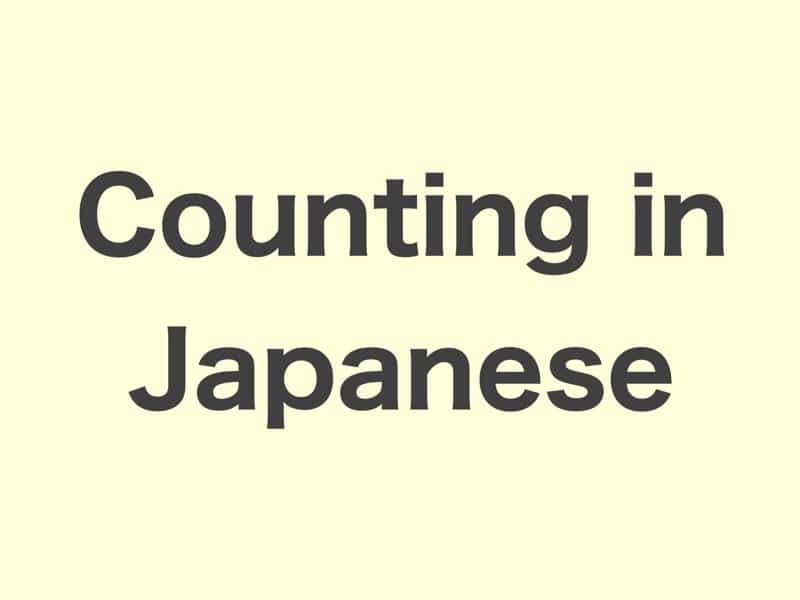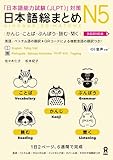JLPT Textbook Recommendations
General Counters
ひとつ (hitotsu), ふたつ (futatsu), etc.:
These are traditional Japanese numbers used for counting general, unspecific items up to ten. They are often taught first to beginners.
- ひとつ (hitotsu) – one
- ふたつ (futatsu) – two
- みっつ (mittsu) – three
- よっつ (yottsu) – four
- いつつ (itsutsu) – five
- むっつ (muttsu) – six
- ななつ (nanatsu) – seven
- やっつ (yattsu) – eight
- ここのつ (kokonotsu) – nine
- とお (tō) – ten
Small Objects
いっこ (ikko), にこ (niko), etc.:
This counter is used for small, round, or compact objects, like apples, candies, or erasers.
- いっこ (ikko) – one small object
- にこ (niko) – two small objects
- さんこ (sanko) – three small objects
- よんこ (yonko) – four small objects
- ごこ (goko) – five small objects
- ろっこ (rokko) – six small objects
- ななこ (nanako) – seven small objects
- はちこ (hachiko) – eight small objects
- きゅうこ (kyūko) – nine small objects
- じゅっこ (jukko) – ten small objects
People
ひとり (hitori), ふたり (futari), さんにん (san nin), etc.:
This counter is specific for counting people. Note the irregular forms for “one person” (ひとり) and “two people” (ふたり).
- ひとり (hitori) – one person (irregular)
- ふたり (futari) – two people (irregular)
- さんにん (san nin) – three people
- よにん (yo nin) – four people
- ごにん (go nin) – five people
- ろくにん (roku nin) – six people
- ななにん (nana nin) – seven people
- はちにん (hachi nin) – eight people
- きゅうにん (kyū nin) – nine people
- じゅうにん (jū nin) – ten people
Animals
いっぴき (ippiki), にひき (nihiki), さんびき (sanbiki), etc.:
This counter is used for small animals, like cats, dogs, and fish. Pay attention to pronunciation changes (like ぴき or びき) depending on the number.
- いっぴき (ippiki) – one small animal
- にひき (nihiki) – two small animals
- さんびき (sanbiki) – three small animals
- よんひき (yonhiki) – four small animals
- ごひき (gohiki) – five small animals
- ろっぴき (roppiki) – six small animals
- ななひき (nanahiki) – seven small animals
- はっぴき (happiki) – eight small animals
- きゅうひき (kyūhiki) – nine small animals
- じゅっぴき (juppiki) – ten small animals
Machines and Vehicles
いちだい (ichi dai), にだい (ni dai), etc.:
This counter is used for machines and vehicles, such as cars, computers, and TVs.
- いちだい (ichi dai) – one machine/vehicle
- にだい (ni dai) – two machines/vehicles
- さんだい (san dai) – three machines/vehicles
- よんだい (yon dai) – four machines/vehicles
- ごだい (go dai) – five machines/vehicles
- ろくだい (roku dai) – six machines/vehicles
- ななだい (nana dai) – seven machines/vehicles
- はちだい (hachi dai) – eight machines/vehicles
- きゅうだい (kyū dai) – nine machines/vehicles
- じゅうだい (jū dai) – ten machines/vehicles
Long, Thin Objects
いっぽん (ippon), にほん (nihon), さんぼん (sanbon), etc.:
This counter applies to long, thin objects like pencils, bottles, and chopsticks. Pronunciation changes for certain numbers, such as いっぽん or さんぼん.
- いっぽん (ippon) – one long, thin object
- にほん (nihon) – two long, thin objects
- さんぼん (sanbon) – three long, thin objects
- よんほん (yonhon) – four long, thin objects
- ごほん (gohon) – five long, thin objects
- ろっぽん (roppon) – six long, thin objects
- ななほん (nanahon) – seven long, thin objects
- はっぽん (happon) – eight long, thin objects
- きゅうほん (kyūhon) – nine long, thin objects
- じゅっぽん (juppon) – ten long, thin objects
Flat Objects
いちまい (ichi mai), にまい (ni mai), etc.:
Use this counter for flat, thin objects like paper, tickets, or plates.
- いちまい (ichi mai) – one flat object
- にまい (ni mai) – two flat objects
- さんまい (san mai) – three flat objects
- よんまい (yon mai) – four flat objects
- ごまい (go mai) – five flat objects
- ろくまい (roku mai) – six flat objects
- ななまい (nana mai) – seven flat objects
- はちまい (hachi mai) – eight flat objects
- きゅうまい (kyū mai) – nine flat objects
- じゅうまい (jū mai) – ten flat objects
Books
いっさつ (issatsu), にさつ (nisatsu), etc.:
This counter is specific to bound volumes like books or magazines.
- いっさつ (issatsu) – one book
- にさつ (nisatsu) – two books
- さんさつ (sansatsu) – three books
- よんさつ (yonsatsu) – four books
- ごさつ (gosatsu) – five books
- ろくさつ (rokusatsu) – six books
- ななさつ (nanasatsu) – seven books
- はちさつ (hachisatsu) – eight books
- きゅうさつ (kyūsatsu) – nine books
- じゅっさつ (jussatsu) – ten books
Copies or Portions
いちぶ (ichi bu), にぶ (ni bu), etc.:
Use this counter for parts of documents, copies of a report, or portions of something divided.
- いちぶ (ichi bu) – one portion
- にぶ (ni bu) – two portions
- さんぶ (san bu) – three portions
- よんぶ (yon bu) – four portions
- ごぶ (go bu) – five portions
- ろくぶ (roku bu) – six portions
- ななぶ (nana bu) – seven portions
- はちぶ (hachi bu) – eight portions
- きゅうぶ (kyū bu) – nine portions
- じゅうぶ (jū bu) – ten portions
Drinks in Cups/Glasses
いっぱい (ippai), にはい (nihai), さんばい (sanbai), etc.:
This counter is for liquid portions in cups or glasses. Pronunciation changes occur (like いっぱい, さんばい).
- いっぱい (ippai) – one drink
- にはい (nihai) – two drinks
- さんばい (sanbai) – three drinks
- よんはい (yonhai) – four drinks
- ごはい (gohai) – five drinks
- ろくはい (rokuhai) – six drinks
- ななはい (nanahai) – seven drinks
- はっぱい (happai) – eight drinks
- きゅうはい (kyūhai) – nine drinks
- じゅうはい (jūhai) – ten drinks
Rank/Order
いちばん (ichiban), にばん (niban), etc.:
This counter is for rankings or order in competitions, lines, or preferences.
- いちばん (ichiban) – first place
- にばん (niban) – second place
- さんばん (sanban) – third place
- よんばん (yonban) – fourth place
- ごばん (goban) – fifth place
- ろくばん (rokuban) – sixth place
- ななばん (nanaban) – seventh place
- はちばん (hachiban) – eighth place
- きゅうばん (kyūban) – ninth place
- じゅうばん (jūban) – tenth place
Pages
いちページ (ichi pēji), にページ (ni pēji), etc.:
This counter is used for pages in a book, notebook, or document.
- いちページ (ichi pēji) – one page
- にページ (ni pēji) – two pages
- さんページ (san pēji) – three pages
- よんページ (yon pēji) – four pages
- ごページ (go pēji) – five pages
- ろくページ (roku pēji) – six pages
- ななページ (nana pēji) – seven pages
- はちページ (hachi pēji) – eight pages
- きゅうページ (kyū pēji) – nine pages
- じゅうページ (jū pēji) – ten pages
Floors of a Building
いっかい (ikkai), にかい (nikai), さんがい (sangai), etc.:
This counter is used for counting floors in a building. Note irregular forms like さんがい (3rd floor).
- いっかい (ikkai) – first floor
- にかい (nikai) – second floor
- さんがい (sangai) – third floor
- よんかい (yonkai) – fourth floor
- ごかい (gokai) – fifth floor
- ろっかい (rokkai) – sixth floor
- ななかい (nanakai) – seventh floor
- はちかい (hachikai) – eighth floor
- きゅうかい (kyūkai) – ninth floor
- じゅうかい (jūkai) – tenth floor





コメント